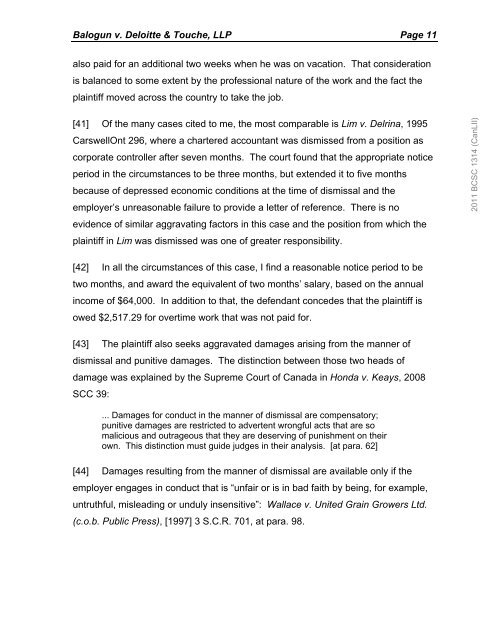FAQ's Cases - Stewart McKelvey
FAQ's Cases - Stewart McKelvey
FAQ's Cases - Stewart McKelvey
- No tags were found...
Create successful ePaper yourself
Turn your PDF publications into a flip-book with our unique Google optimized e-Paper software.
Balogun v. Deloitte & Touche, LLP Page 11also paid for an additional two weeks when he was on vacation. That considerationis balanced to some extent by the professional nature of the work and the fact theplaintiff moved across the country to take the job.[41] Of the many cases cited to me, the most comparable is Lim v. Delrina, 1995CarswellOnt 296, where a chartered accountant was dismissed from a position ascorporate controller after seven months. The court found that the appropriate noticeperiod in the circumstances to be three months, but extended it to five monthsbecause of depressed economic conditions at the time of dismissal and theemployer’s unreasonable failure to provide a letter of reference. There is noevidence of similar aggravating factors in this case and the position from which theplaintiff in Lim was dismissed was one of greater responsibility.2011 BCSC 1314 (CanLII)[42] In all the circumstances of this case, I find a reasonable notice period to betwo months, and award the equivalent of two months’ salary, based on the annualincome of $64,000. In addition to that, the defendant concedes that the plaintiff isowed $2,517.29 for overtime work that was not paid for.[43] The plaintiff also seeks aggravated damages arising from the manner ofdismissal and punitive damages. The distinction between those two heads ofdamage was explained by the Supreme Court of Canada in Honda v. Keays, 2008SCC 39:... Damages for conduct in the manner of dismissal are compensatory;punitive damages are restricted to advertent wrongful acts that are somalicious and outrageous that they are deserving of punishment on theirown. This distinction must guide judges in their analysis. [at para. 62][44] Damages resulting from the manner of dismissal are available only if theemployer engages in conduct that is “unfair or is in bad faith by being, for example,untruthful, misleading or unduly insensitive”: Wallace v. United Grain Growers Ltd.(c.o.b. Public Press), [1997] 3 S.C.R. 701, at para. 98.
















